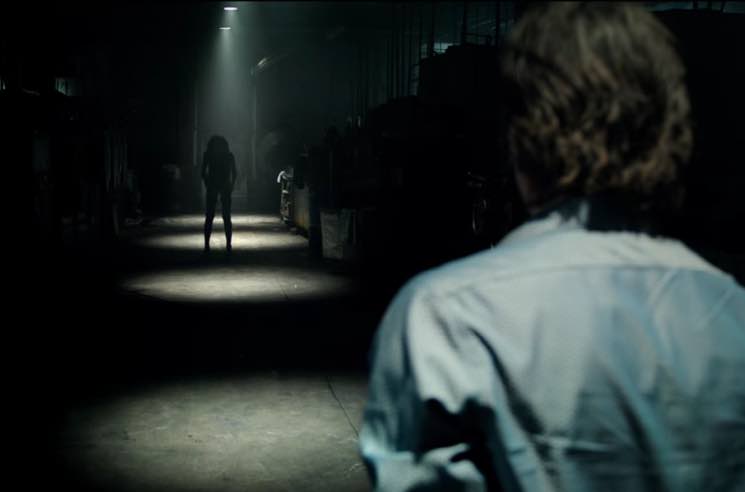David F. Sandberg's acclaimed 2013 short film Lights Out was an excellent study in making the everyday seem terrifying. In less than three minutes, the film follows a woman who is increasingly paranoid that a strange presence is lurking in her home — a presence that disappears whenever she turns the lights on. The original Lights Out trades in pure, simple tension that builds up to a single, effective jump scare.
It was an auspicious start to a career that's now being endorsed by horror-master-of-the-moment James Wan, who saw promise in Sandberg's creative approach to horror clichés like light, darkness and silence. Unfortunately, Sandberg's first feature-length film, based on the short, is a bit bloated with all the things the original short wisely did without. At only 81 minutes, Lights Out shoves in too much of a tired, well-worn backstory before becoming, essentially, a bag of tricks. It's a fun bag of tricks, but they're less organic and far more slick than the simple effectiveness of the original short.
After Sophie's (Maria Bello) husband is killed by a mysterious force in his factory (in one of the film's most effective scenes), she starts exhibiting strange behaviour. After behaving erratically and talking to an invisible person in her closet all night, her young son Martin (Gabriel Batemen) insists on going to stay with her estranged half-sister Rebecca (Teresa Palmer). Rebecca, after abandoning their mother years ago due to not being able to cope with her odd, destructive behaviour, is reluctant to get involved, but is soon forced to after the mysterious force around her mother is revealed to be a malicious spirit intent on murder as soon as the lights go out.
There's a couple of great scenes that really shine, like when the film's brisk pacing slows down enough for Maria Bello's character to be truly unsettling and unhinged. The film lightly steps on some metaphors for the darkness that inhabits a person struggling with depression, and while a bit heavy-handed and not as deft as films like The Babadook, Bello's performance is so effective that it makes you forget her character is a rehash of every "hysterical depressive mom" you've seen in horror.
This is a problem that runs throughout Lights Out. It's less exciting than the short, because it's nothing new. Lights Out trades extensively in genre tropes, and tosses them all at the viewer one right after the other in excessive exposition scenes. It's short for a feature-length film, so its plot progresses so quickly that it's almost not needed.
To compare again to the original short, 2013's Lights Out proved that a paranormal creature's backstory isn't as important as the tension that ramps up before the creature is revealed. Once the Lights Out remake decides it doesn't need to explain away every facet of its central demonic force, it becomes a solid scare generator in its last act. Introducing a series of clever plays on using light to make the creature disappear as well as cool lighting tricks in general to make darkness really, really foreboding, Lights Out is a better movie, like its predecessor, when it puts plot and exposition second, not first. (Warner Bros.)
It was an auspicious start to a career that's now being endorsed by horror-master-of-the-moment James Wan, who saw promise in Sandberg's creative approach to horror clichés like light, darkness and silence. Unfortunately, Sandberg's first feature-length film, based on the short, is a bit bloated with all the things the original short wisely did without. At only 81 minutes, Lights Out shoves in too much of a tired, well-worn backstory before becoming, essentially, a bag of tricks. It's a fun bag of tricks, but they're less organic and far more slick than the simple effectiveness of the original short.
After Sophie's (Maria Bello) husband is killed by a mysterious force in his factory (in one of the film's most effective scenes), she starts exhibiting strange behaviour. After behaving erratically and talking to an invisible person in her closet all night, her young son Martin (Gabriel Batemen) insists on going to stay with her estranged half-sister Rebecca (Teresa Palmer). Rebecca, after abandoning their mother years ago due to not being able to cope with her odd, destructive behaviour, is reluctant to get involved, but is soon forced to after the mysterious force around her mother is revealed to be a malicious spirit intent on murder as soon as the lights go out.
There's a couple of great scenes that really shine, like when the film's brisk pacing slows down enough for Maria Bello's character to be truly unsettling and unhinged. The film lightly steps on some metaphors for the darkness that inhabits a person struggling with depression, and while a bit heavy-handed and not as deft as films like The Babadook, Bello's performance is so effective that it makes you forget her character is a rehash of every "hysterical depressive mom" you've seen in horror.
This is a problem that runs throughout Lights Out. It's less exciting than the short, because it's nothing new. Lights Out trades extensively in genre tropes, and tosses them all at the viewer one right after the other in excessive exposition scenes. It's short for a feature-length film, so its plot progresses so quickly that it's almost not needed.
To compare again to the original short, 2013's Lights Out proved that a paranormal creature's backstory isn't as important as the tension that ramps up before the creature is revealed. Once the Lights Out remake decides it doesn't need to explain away every facet of its central demonic force, it becomes a solid scare generator in its last act. Introducing a series of clever plays on using light to make the creature disappear as well as cool lighting tricks in general to make darkness really, really foreboding, Lights Out is a better movie, like its predecessor, when it puts plot and exposition second, not first. (Warner Bros.)
